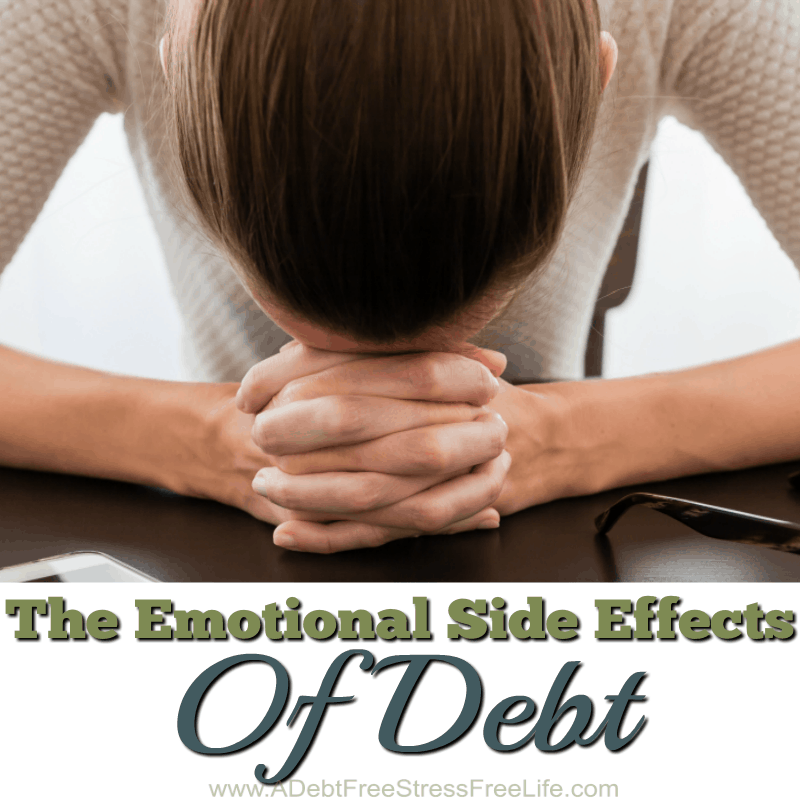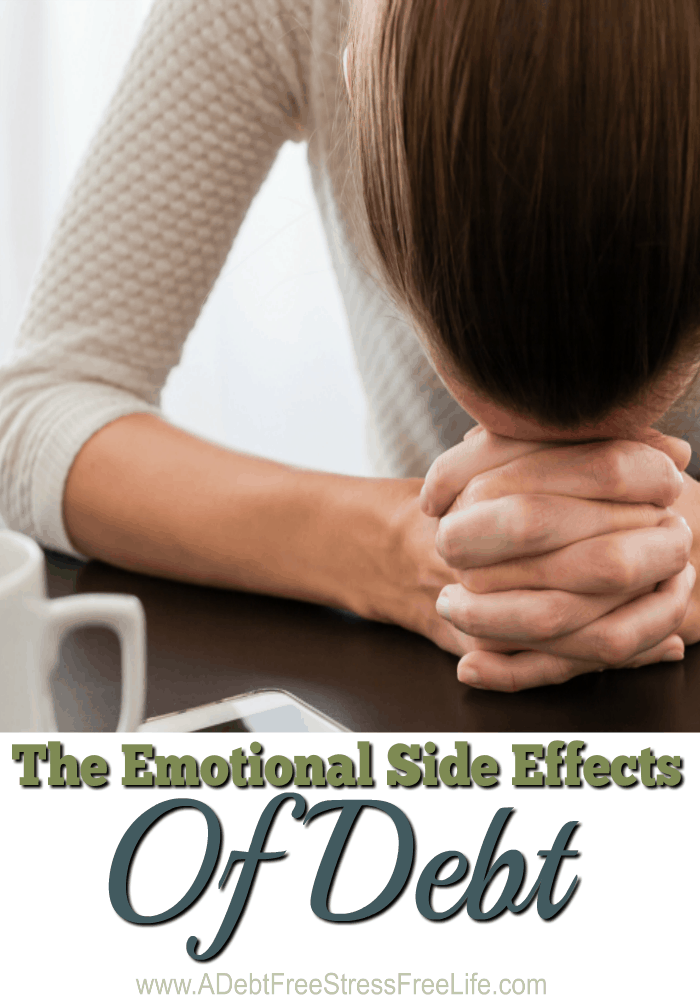A Mess Free Life may collect a share of sales or other compensation from the links on this page.
What’s the first word that comes to mind when I say the word debt? Did you say “credit cards?”
This wouldn’t be incorrect, but most of us spend little time openly discussing the emotional side effects of debt.
The emotional side effects can be more damaging to our self-worth than any amount of money we owe. We can pay off our debt and move on, but often the emotional effects left over from being in debt take longer to heal.
As a society, we need to be willing to talk openly and honestly about the emotional impact of debt. Once we get them out in the open, implementing change becomes easier as we make our way down the path to becoming debt free.

Table of Contents
The Emotional Side Effects of Debt
1. Gives You Amnesia
Here’s a story to illustrate the point.
The other day I was helping a friend with her debt. She was just about to open the folder that contained all her current bills. She happens to owe the IRS, and so I said to her, “How much do you owe the IRS?” She went to open the folder, at which point I put my hand on the cover to stop her. She looked at me and again I asked her, “How much do you owe the IRS?” She said, “I don’t know; I need to look at the statement.”
I asked her how much she had in her checking account, and she replied, “I don’t know.”
That’s what amnesia looks like.
Most people who have debt have amnesia.
When I was in debt, I had it. I didn’t know exactly what I owed, and I never had a handle on how much was in my checking account. I usually had to hunt around the house for my bills, and I’d forget to pay my bills on time resulting in late fees and lots of other drama.
My Good Money Habits Guide has some useful solutions to manage amnesia. But for starters, find a home for your statements. Put them in one place so you know where you can find them when it comes time to pay your bills.
Read: Why Using Cash Only Is Crucial When Getting Out of Debt
2. Gives You A False Sense of Security
If you have “overdraft” protection or carry available credit on your credit cards, it gives you a “false” security you can handle anything that comes up.
The problem becomes when you use your ‘available protection’ to buy things you can’t afford. Your safety net is gone, and your credit cards are maxed out.
The only real safety net is a well-established emergency fund and zero credit card debt.
Read: There’s No Magic Bullet To Getting Out of Debt
3. Diminishes Your Quality of Life
I’m going to touch on two significant ways debt diminishes the quality of your life.
First, your less likely to find a marriage partner if you have large debt. If you’re single, over the age of 30 and carry a significant amount of debt it lowers your ability to land a mate. Imagine having 50K in credit card debt and having to tell your future spouse about this debt? Or what if the person you were interested in said they had significant debt. Would it change the way you feel about them? Statistics say it would.
Second, you’re more likely to have to change your living situation. We’ve all heard the stories of people having to move back in with mom and dad because they can’t cover their mortgage. They’ve lost their home, and the only alternative due to their horrendous debt problem is to go and live with mom and pop. Do you think living with your parents sounds like fun when you’re 40? Probably not.
There are other ways that debt diminishes your quality of life. Maybe you’re currently experiencing one of them.
Read: The 6 Steps To Saving As A Means Of Getting Out Of Debt
4. Lowers Your Self Worth
Your self-worth and net worth are closely related.
Here’s why: People use money to fill unmet needs.
Sometimes it’s about being valued; sometimes it’s about feeling loved. No matter what it is, it’s related to an unmet need, and that unmet need is tied to your feelings of self-worth.
When you incur debt as a result of trying to meet those unmet needs, you begin the cycle of shame, guilt, blame and fear (which will cover in the last bullet). Coming from a place of shame and guilt chips away at your self-worth and shows up in your bank balances and credit card statements.
Work on your self-worth, learning to fill your needs in other ways, and your net worth will improve.
Read: How To Love Your Money: Managing Debt
5. Creates Anxiety and Fear
You go to the mailbox and inside is a stack of credit card statements. Your heart begins to race and pound. You don’t want to look at the statements, so you hide them away.
Eventually, you look at the bills and are stunned by the amount you have charged. You don’t even remember buying half the stuff (remember amnesia).
As time passes your anxiety turns to fear: fear of the debt, fear you will never be able to pay it off, fear you’ll become homeless. You lay in bed at night and worry about it all.
That’s what debt is doing to you.
And, even if you can make the minimum payment you’re still in a big mess.
You’ve got two choices: do nothing or do something.
If you’re ready to do something, I invite you to start here. Implement the action steps in the Good Money Habits Guide and see your behaviors and thoughts around debt start to change. If while working through the steps you get stuck and have a question, feel free to drop me an email.
I’ve been there, and I’m happy to help.


